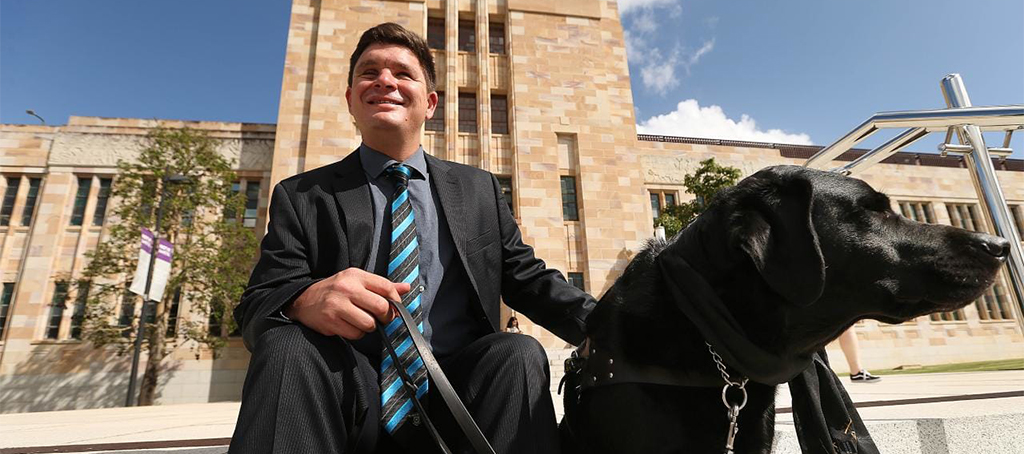Seeing Beyond Disability

I write you this missive from Harvard Law School, 1585 Massachusetts Avenue, Austin Hall, Room 306. This is my office, well, it is for another 4 hours. Then I prematurely leave my Fulbright to head home.
Unique in Fulbright Scholars, this cohort have experienced the greatest upheaval and many have raced home before borders are closed. Still, in the scheme of things no big deal.
Just before I arrived here, one month ago, I sent my hosts this note:
“In reality I would like to finish the Fulbright and have you both glad that you supported my application — if I achieve this, I regard everything else as a bonus.”
So if I use that benchmark, I have a ‘Pass’, at least. I have missed out on a lot due to the pandemic, but, thus far at least, I have fortunately missed out on getting sick. And you cannot have wealth without health, and no matter how much wealth you have, you cannot buy health.
I have just joined the Fulbright Community and no doubt there will be future events and those of us from the ‘Coronavirus Fulbrighters’ will have some unique stories to tell.
Signing off with my last note from the USA for this trip,
Paul, 3/20/2020
Dr Paul Harpur’s Fulbright Future Scholarship aimed at critically examining how ‘universal’ design systems are made, to ensure that the most silent and vulnerable persons with disabilities are not excluded from this transformational reform agenda.
His project involved primary research on disability and technology, with plans to enhance links with overseas disability research centers, including the Harvard Law School Project on Disability and the Burton Blatt Institute at Syracuse University.
Yet face-to-face interviews, workshops and conferences became a sudden and abrupt impossibility with the social distancing caused by the COVID-19 pandemic that hit in full force two weeks into his three month project.
The pandemic meant his method was impossible, but despite the setbacks, Paul still found a way to not only keep the project alive, but broaden its scope to include the impact that public health crises have on society’s most vulnerable.
“In my wildest dreams I would not have wanted to live through a pandemic, but what an opportunity to gather data on how society reacts to ability diversity when the institutions and rules in society fall apart.”
Paul rapidly pivoted his plans to analyse how the pandemic was impacting upon people with a disability, and he immediately sought ethics clearance for a new project: Academics with disabilities during COVID-19. He reorganised meetings to source feedback from experts working in medical and data ethics at Harvard University, including the Harvard Law School Project on Disability, the Petrie-Flom Center, and the Berkman Klein Center, resulting in significant new connections and new publishing opportunities.
Across March and April, with the pandemic rapidly escalating in severity, Paul still forged ahead with meetings, workshops, and symposia making use of technology where social distancing prevented face-to-face meetings. His findings have resulted in research papers, articles, and even a speaking spot in an upcoming TEDx talk. In the midst of all this, he was nominated for, and won, an Australian Award for University Teaching through Universities Australia, for his work leading ability equality in the university sector and promoting universal design on campus.
But it wasn’t easy – Paul faced a number of challenges as a sight-impaired individual alone in a foreign country. The Harvard Law School Project on Disability had arranged exceptional supports, and when they fell apart with COVID-19, went above and beyond expectations in offering alternative assistance.
It turns out that support was needed. Paul had left his guide dog back in Australia and was navigating using only a white cane. He had worked out certain locations to source food and supplies, only to have the doors on several shops close when social distancing rules hit. Bus services and taxis became harder to source as services became suspended. When libraries shut their doors and most student and staff started working from home, it was unfortunately time for Paul to head home to Australia.
“My time at Harvard began with a splash – my hosts at the Harvard Law School Project on Disability had organised a fantastic workshop, joint-funded with the Harvard Committee on Australian Studies. Through this I was able to actually meet with the people tasked with drafting the new University-wide Digital Accessibility Policy.
“The policy aims to make information and resources more easily available to those who need it at Harvard, and while I believe the rules still need to be broader in scope, their commitment to improving information access should be applauded.”
Now back home, Paul plans to maintain the links he forged during his time in Boston, and follow up on at least five new projects that have stemmed from his Fulbright research. Despite the dire circumstances that brought him home early, Paul’s thoughts on it all is refreshing and circumspect.
“Those of us who were privileged to be abroad in the first half of 2020 had the most unique of all experiences — we are the only Fulbright cohort to have lived through a global pandemic. COVID-19 cut our projects short and caused us anguish, but it also bought us closer to our fellow Fulbrighters, those who we were visiting and provided new opportunities.
“This is a moment in time that washed away society’s veneer and laid stark prejudice, challenges and love.”
Paul’s vision for ability equality is closer than ever to being realised, thanks to his resilience in the face of overwhelming challenge; a hallmark of his approach to life thus far.
Copyright © 2021 – Fulbright


 Facebook
Facebook Twitter
Twitter Linkedin
Linkedin Instagram
Instagram